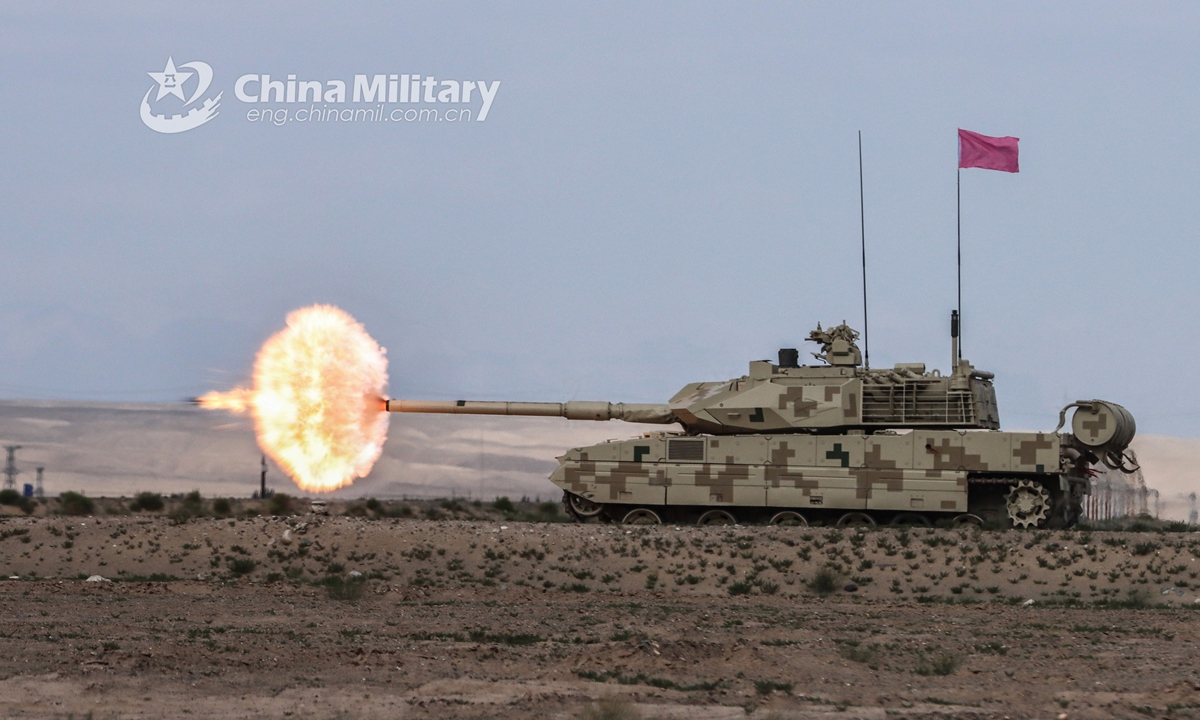
A main battle tank attached to a combined arms regiment under the PLA Nanjiang Military Command spits fires in a military shooting range in China’s Xinjiang Uyghur Autonomous Region on July 26, 2021. (eng.chinamil.com.cn/Photo by Tang Yayun)
The Chinese People's Liberation Army (PLA) Tibet Military Command recently organized large-scale joint exercises in a snowy plateau region, in which the troops operated some of the PLA's latest weapons and equipment and practiced multidimensional tactics with the goal of target elimination.
Held at an elevation of about 4,500 meters, the Snowfield Duty-2021 exercise featured more than 10 brigades and regiments affiliated with the PLA Tibet Military Command and set the theme of joint, multidimensional combat in plateau and mountainous regions, China Central Television (CCTV) reported on Wednesday.
The drills involved the use of live ammunition, different time periods and terrain as well as all types of combat elements, the report said.
It showed the combat capabilities in joint plateau operations of the PLA forces and their determination in safeguarding China's border and the stability of Tibet, CCTV said.
Kicking off the exercises, a combined arms brigade mobilized and maneuvered to the mission area under the cover of darkness, and launched the first wave of attacks at midnight, as artillery forces rained down munitions on hostile reconnaissance and early warning facilities using howitzers and multiple rocket launcher systems, before destroying hostile communication centers and helicopter pads.
In the early hours in the second day of the drills, a reconnaissance unit took vantage points by getting to the peak of a 6,100 meter mountain. They set up observation positions and provided guidance for precision strikes on key hostile targets behind defense lines.
Anti-aircraft batteries deployed by a defense brigade launched missiles to intercept hostile aircraft, clearing the sky of enemy threats, and that was when the main forces - tanks, infantry fighting vehicles and assault vehicles - pushed forward to capture hostile positions.
Amid the heated combat, an intelligence reconnaissance brigade started electromagnetic disruption of hostile communications facilities, giving the troops another advantage.
Attack helicopters of an army aviation brigade took off for additional multidimensional fire support, as the artillery positions were exposed and the self-propelled howitzers and multiple rocket launcher systems had to be relocated.
Supporting the march, sappers cleared vital lanes of obstacles with explosives, and transport helicopters carried scouts who landed deep behind enemy defense lines for infiltration missions.
Logistics support units kept sending munitions and food to the frontline, keeping the troops in good combat status as they broke through enemy defense lines before noon.
After neutralizing all enemies and seizing control of all hostile positions, the troops switched to the defense, marking the end of the drills.
The exercise comprehensively explored the combat performance of all the units and all the weapons and equipment, as they further enhance combat capabilities of joint operations, precision strikes, high-efficiency damage and comprehensive logistics support in high-altitude regions, CCTV said.
The exercise was notable for the number of troops involved, the wide variety of tactics and combat elements as well as the deployment of advanced weaponry like the Type 15 light tanks, a Chinese military expert who requested anonymity told the Global Times on Wednesday




